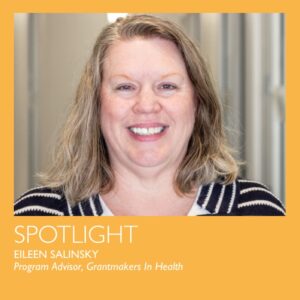After 18 years at Grantmakers In Health (GIH), Eileen Salinsky, longtime Program Advisor and former Vice President for Program and Strategy, has announced her retirement. Her last day at GIH will be Friday, March 21, 2025.
Eileen was recruited as GIH’s Vice President for Program and Strategy by former President and CEO Lauren LeRoy in 2007. Family obligations required Eileen to step back from her management position, but she stayed on part-time as a Program Adviser for almost two decades. In that role, she was responsible for leading GIH’s population health and advocacy strategies programs and partnered closely with other philanthropy-serving organizations including Funders’ Committee for Civic Participation, Philanthropy for Active Civic Engagement, Census Equity Initiative, and the United Philanthropy Forum. She most recently helped launch GIH’s policy agenda, organized GIH’s Firearm Violence Prevention Learning Community, contributed to the creation of the Health Policy Update newsletter, and worked closely on a range of policy-related programming, among other significant contributions.
“Over the years, it’s been such a great group of people to work with,” Eileen said while reflecting on her time at GIH. “When I look back over my career, the GIH community, staff and our Funding Partners has been the most so collegial, supportive, and fun. When I first joined, my former boss was on the GIH board. He told me that there was a lot of esprit de corps in the staff—and that definitely proved true.”
Eileen noted that during her tenure, there has been a sea change regarding the extent that health funders are engaging in policy, increasing investment in policy change, and supporting increasingly impactful advocacy strategies. Eileen feels that of all her contributions to GIH, her support for long-term investments in community power building and her elevation of important but less prioritized issues like the Census have had the biggest influence on the field. “A really fulfilling moment was when a funder told me that a program that I organized motivated their decision to fund Census work—it was a really gratifying thing to hear,” she said.
Elevating the importance of firearm violence prevention among health funders has also been a priority for Eileen. “In the firearm violence prevention work—a topic I’ve covered since I’ve been at GIH—it’s really encouraging to see so many more funders starting to fund in this space,” Eileen said. “Even as recently as 2020, less than a quarter of our funders were funding firearm violence prevention work. But as we found in our recent survey, it’s now almost 60 percent. I can’t claim credit for it, but I’m excited to see it happen.”
Eileen’s colleagues Ann Rogers, Colin Pekruhn, and Kate Treanor on the GIH program team were effusive in their praise, expressing how much they will miss her deep knowledge of health policy, heartfelt and passionate style, willingness to mentor and lead staff on policy, as well as her “wry and witty sense of humor that helped us all keep a healthy perspective.”
Before joining GIH, Eileen served as Principal Research Associate at the National Health Policy Forum, where she led the forum’s public health and safety net activities and worked to educate congressional policymakers and their staff on health policy. She was also the former Director of Public Health Policy in the Office of the Assistant Secretary for Planning and Evaluation at the U.S. Department of Health and Human Services and served as a Vice President at The Lewin Group, a health care and human services consulting and policy analysis firm.
Eileen is looking forward to kicking off her retirement with a wine tour of Chile and Argentina in the fall with her husband and friends. She is also excited to spend more time with her family, including her Norfolk Terrier, Howie, a recent addition.
Even with travel to South America on the horizon, Eileen is still thinking about philanthropy’s critical role in communities around the country.
“The times are challenging now, and philanthropy is needed now more than ever,” she said. “It really can play an important role in addressing the threats that we face to our democracy, our health, and our civil society.”

